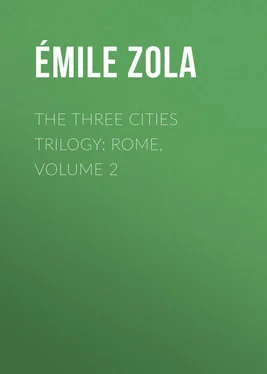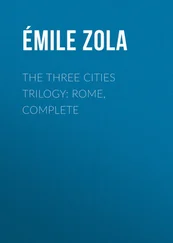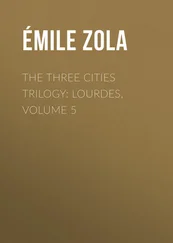Émile Zola - The Three Cities Trilogy - Rome, Volume 2
Здесь есть возможность читать онлайн «Émile Zola - The Three Cities Trilogy - Rome, Volume 2» — ознакомительный отрывок электронной книги совершенно бесплатно, а после прочтения отрывка купить полную версию. В некоторых случаях можно слушать аудио, скачать через торрент в формате fb2 и присутствует краткое содержание. Жанр: literature_19, foreign_antique, foreign_prose, на английском языке. Описание произведения, (предисловие) а так же отзывы посетителей доступны на портале библиотеки ЛибКат.
- Название:The Three Cities Trilogy: Rome, Volume 2
- Автор:
- Жанр:
- Год:неизвестен
- ISBN:нет данных
- Рейтинг книги:4 / 5. Голосов: 1
-
Избранное:Добавить в избранное
- Отзывы:
-
Ваша оценка:
- 80
- 1
- 2
- 3
- 4
- 5
The Three Cities Trilogy: Rome, Volume 2: краткое содержание, описание и аннотация
Предлагаем к чтению аннотацию, описание, краткое содержание или предисловие (зависит от того, что написал сам автор книги «The Three Cities Trilogy: Rome, Volume 2»). Если вы не нашли необходимую информацию о книге — напишите в комментариях, мы постараемся отыскать её.
The Three Cities Trilogy: Rome, Volume 2 — читать онлайн ознакомительный отрывок
Ниже представлен текст книги, разбитый по страницам. Система сохранения места последней прочитанной страницы, позволяет с удобством читать онлайн бесплатно книгу «The Three Cities Trilogy: Rome, Volume 2», без необходимости каждый раз заново искать на чём Вы остановились. Поставьте закладку, и сможете в любой момент перейти на страницу, на которой закончили чтение.
Интервал:
Закладка:
Then, in the following year, Orlando plunged into epopoeia once more. Garibaldi had returned from his two sojourns in America, with the halo of a legend round him – paladin-like feats in the pampas of Uruguay, an extraordinary passage from Canton to Lima – and he had returned to take part in the war of 1859, forestalling the French army, overthrowing an Austrian marshal, and entering Como, Bergamo, and Brescia. And now, all at once, folks heard that he had landed at Marsala with only a thousand men – the Thousand of Marsala, the ever illustrious handful of braves! Orlando fought in the first rank, and Palermo after three days' resistance was carried. Becoming the dictator's favourite lieutenant, he helped him to organise a government, then crossed the straits with him, and was beside him on the triumphal entry into Naples, whose king had fled. There was mad audacity and valour at that time, an explosion of the inevitable; and all sorts of supernatural stories were current – Garibaldi invulnerable, protected better by his red shirt than by the strongest armour, Garibaldi routing opposing armies like an archangel, by merely brandishing his flaming sword! The Piedmontese on their side had defeated General Lamoriciere at Castelfidardo, and were invading the States of the Church. And Orlando was there when the dictator, abdicating power, signed the decree which annexed the Two Sicilies to the Crown of Italy; even as subsequently he took part in that forlorn attempt on Rome, when the rageful cry was "Rome or Death!" – an attempt which came to a tragic issue at Aspromonte, when the little army was dispersed by the Italian troops, and Garibaldi, wounded, was taken prisoner, and sent back to the solitude of his island of Caprera, where he became but a fisherman and a tiller of the rocky soil. 2 2 M. Zola's brief but glowing account of Garibaldi's glorious achievements has stirred many memories in my mind. My uncle, Frank Vizetelly, the war artist of the /Illustrated London News/, whose bones lie bleaching somewhere in the Soudan, was one of Garibaldi's constant companions throughout the memorable campaign of the Two Sicilies, and afterwards he went with him to Caprera. Later, in 1870, my brother, Edward Vizetelly, acted as orderly-officer to the general when he offered the help of his sword to France. – Trans.
Six years of waiting again went by, and Orlando still dwelt at Turin, even after Florence had been chosen as the new capital. The Senate had acclaimed Victor Emmanuel, King of Italy; and Italy was indeed almost built, it lacked only Rome and Venice. But the great battles seemed all over, the epic era was closed; Venice was to be won by defeat. Orlando took part in the unlucky battle of Custozza, where he received two wounds, full of furious grief at the thought that Austria should be triumphant. But at that same moment the latter, defeated at Sadowa, relinquished Venetia, and five months later Orlando satisfied his desire to be in Venice participating in the joy of triumph, when Victor Emmanuel made his entry amidst the frantic acclamations of the people. Rome alone remained to be won, and wild impatience urged all Italy towards the city; but friendly France had sworn to maintain the Pope, and this acted as a check. Then, for the third time, Garibaldi dreamt of renewing the feats of the old-world legends, and threw himself upon Rome like a soldier of fortune illumined by patriotism and free from every tie. And for the third time Orlando shared in that fine heroic madness destined to be vanquished at Mentana by the Pontifical Zouaves supported by a small French corps. Again wounded, he came back to Turin in almost a dying condition. But, though his spirit quivered, he had to resign himself; the situation seemed to have no outlet; only an upheaval of the nations could give Rome to Italy.
All at once the thunderclap of Sedan, of the downfall of France, resounded through the world; and then the road to Rome lay open, and Orlando, having returned to service in the regular army, was with the troops who took up position in the Campagna to ensure the safety of the Holy See, as was said in the letter which Victor Emmanuel wrote to Pius IX. There was, however, but the shadow of an engagement: General Kanzler's Pontifical Zouaves were compelled to fall back, and Orlando was one of the first to enter the city by the breach of the Porta Pia. Ah! that twentieth of September – that day when he experienced the greatest happiness of his life – a day of delirium, of complete triumph, which realised the dream of so many years of terrible contest, the dream for which he had sacrificed rest and fortune, and given both body and mind!
Then came more than ten happy years in conquered Rome – in Rome adored, flattered, treated with all tenderness, like a woman in whom one has placed one's entire hope. From her he awaited so much national vigour, such a marvellous resurrection of strength and glory for the endowment of the young nation. Old Republican, old insurrectional soldier that he was, he had been obliged to adhere to the monarchy, and accept a senatorship. But then did not Garibaldi himself – Garibaldi his divinity – likewise call upon the King and sit in parliament? Mazzini alone, rejecting all compromises, was unwilling to rest content with a united and independent Italy that was not Republican. Moreover, another consideration influenced Orlando, the future of his son Luigi, who had attained his eighteenth birthday shortly after the occupation of Rome. Though he, Orlando, could manage with the crumbs which remained of the fortune he had expended in his country's service, he dreamt of a splendid destiny for the child of his heart. Realising that the heroic age was over, he desired to make a great politician of him, a great administrator, a man who should be useful to the mighty nation of the morrow; and it was on this account that he had not rejected royal favour, the reward of long devotion, desiring, as he did, to be in a position to help, watch, and guide Luigi. Besides, was he himself so old, so used-up, as to be unable to assist in organisation, even as he had assisted in conquest? Struck by his son's quick intelligence in business matters, perhaps also instinctively divining that the battle would now continue on financial and economic grounds, he obtained him employment at the Ministry of Finances. And again he himself lived on, dreaming, still enthusiastically believing in a splendid future, overflowing with boundless hope, seeing Rome double her population, grow and spread with a wild vegetation of new districts, and once more, in his loving enraptured eyes, become the queen of the world.
Читать дальшеИнтервал:
Закладка:
Похожие книги на «The Three Cities Trilogy: Rome, Volume 2»
Представляем Вашему вниманию похожие книги на «The Three Cities Trilogy: Rome, Volume 2» списком для выбора. Мы отобрали схожую по названию и смыслу литературу в надежде предоставить читателям больше вариантов отыскать новые, интересные, ещё непрочитанные произведения.
Обсуждение, отзывы о книге «The Three Cities Trilogy: Rome, Volume 2» и просто собственные мнения читателей. Оставьте ваши комментарии, напишите, что Вы думаете о произведении, его смысле или главных героях. Укажите что конкретно понравилось, а что нет, и почему Вы так считаете.












